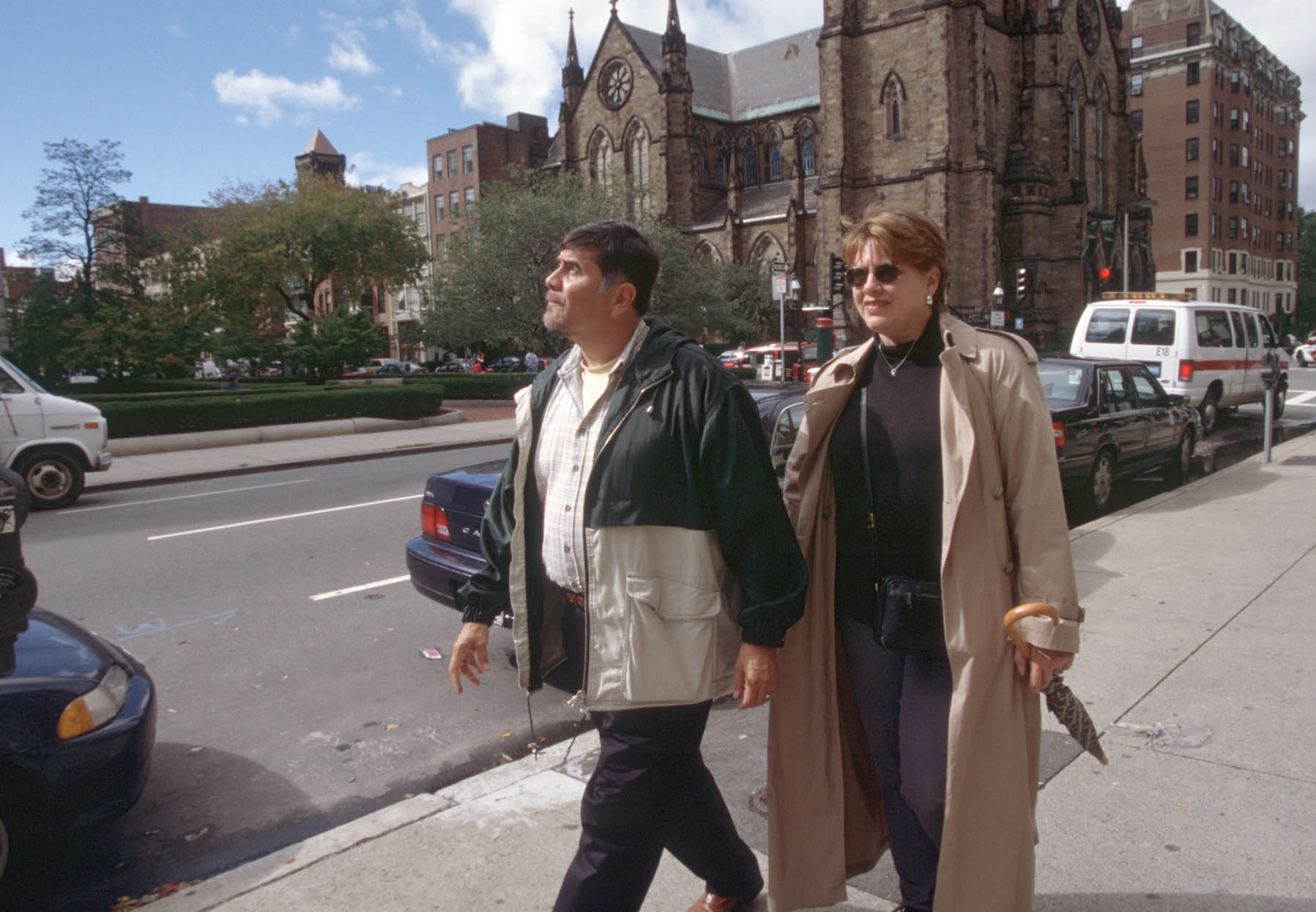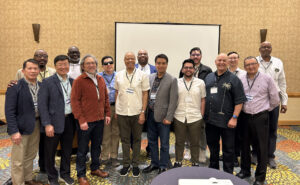
LOWELL, Mass. (BP)–The numbers were small that particular night at the Abundant Life Fellowship, meeting on the campus of the University of Massachusetts in Lowell. But for guest Bible study leader John Ramirez the payoff for such experiences comes in working with students like Jennifer Wangia — a Kenya native seeking to grow spiritually as well as intellectually in the overwhelmingly secular environment of the college campus.
“The reason why I keep coming back is this gives us a great place to grow spiritually on a campus that is not Christian at all,” she said after the study. “It’s pretty much the only place where you can come and feel comfortable talking as Christians, sharing and things like that.”
That is the need that energizes Ramirez, who serves as director of collegiate ministries for the Baptist Convention of New England and a North American Mission Board missionary. He was featured with his wife, Anna, during the March 5-12 Week of Prayer for North American Missions.
With the limited resources of what constitutes a minority religious group in the Northeast, he hopes to make an impact on 275 college campuses — including some of the country’s most prestigious institutions of higher education.
It is in this environment that Ramirez is helping craft a different sort of paradigm for campus ministry. It is one in which meetings are fewer, numbers are smaller and backgrounds are more diverse — but relationships are critical to making a lasting impact on leaders of tomorrow.
“In that short time that we have them, we try to mature them as Christians,” he said. “If they’re seekers, we try to introduce them to Christ. If they are Christians already, we grow them, send them out into the marketplace and give them a good church base as much as we can.”
Like many of the Southern Baptist leaders in New England, the Ramirez’s roots are in the South. They both grew up in Oklahoma, where they were involved in student ministry through Ramirez’s work at several campuses — ultimately at Oklahoma State University in Stillwater. But through involvement in mission projects, they increasingly felt the call to serve in a new-work area.
“With each passing trip it just seemed like I was leaving more and more of my heart in these areas, and I remember I was very disturbed about something I saw,” he said. “I always believed that it was just the young maverick pastors and visionaries who went to minister in newer work areas, but I soon realized that there were many who simply went there to retire or escape.”
Ramirez came to his current position on a 10-month sabbatical, what he thought would be a short-term assignment. But both he and Anna fell in love with New England and its people, and the position was made permanent. His students at OSU knew better than he did what God had in store.
“When they did their farewell party at the end of the semester, it had a tremendous air of finality to it,” he said. “They said, ‘Your heart’s not here anymore. It seems to be somewhere else.'”
Shortly after they began their assignment, the Ramirezes knew the students were right. While others speak of a period of adjustment when changing cultures so abruptly, they immediately fell in love with the region and its people. Within a few months his position was made permanent.
“When I arrived in New England I thought, ‘What a wonderful, wonderful place,'” he said. “The sense of community here is just amazing to me. Once you get past the facade of the fast pace of Boston and New England … there is a real sincerity to these people.”
Anna, too, quickly fit in, as a volunteer teaching conversational English at the Massachusetts Institute of Technology, then being able to minister to internationals through employment at an immigration law firm. This year she was chosen as coordinator of volunteers for Hearts for Boston, the name local Southern Baptists have chosen for the city’s Strategic Focus Cities effort. The initiative — sponsored nationally by the North American Mission Board — will bring volunteers and other resources to the city culminating in 2001 for evangelism and ministry.
“It’s really exciting to see how God is taking past experiences and putting them into operation here,” she said.
In John Ramirez’s collegiate work, one of his first tasks was to strengthen the campus ministries in Worcester, just a few miles from his home and the convention’s offices in Northborough.
He developed a team approach that he hopes to implement throughout the convention. Rather than some schools having campus ministry programs and others having nothing, Ramirez networks both collegiate ministers and the students throughout a particular city for once-a-week meetings. Out of that base programs eventually can be started on campuses where no collegiate minister is assigned.
“That’s really the only way we’re going to reach metropolitan areas with multiple schools,” he said. “The various schools meet together for large events but hold individual Bible studies at their schools.”
With the campus ministry work in Worcester now more self-sufficient, Ramirez is able to spend more of his time coordinating similar efforts throughout the convention — which includes Connecticut, Rhode Island, Massachusetts, Vermont, New Hampshire and Maine. Much like a director of missions does for pastors, he offers support, advice and encouragement for campus ministers.
It is a lonely ministry at times, he said, particularly for campus ministers from the South. They are unaccustomed to Baptist ministry being compared to cults on campuses that have largely rejected Christian philosophy.
But Ramirez said an odd paradox has resulted in recent years. As religious pluralism and diversity have become the norm, evangelical Christians find themselves on the receiving end of benefits available to “fringe” religious groups. Thus they now are much more likely to be granted meeting rooms, club fees for expenses and other privileges of student organizations.
“We’re kind of riding the wave of diversity right now,” he said.
The campus minister at Harvard, for instance, has a small office in the university’s Memorial Chapel alongside many diverse religious influences. But it is a valued presence on one of the nation’s most important campuses.
There are restrictions that go along with the access. Some forms of evangelism such as mass tract distribution are prohibited on campus, for instance. But Ramirez said they are still able to invite people to their meetings, where they have the opportunity to hear the gospel.
“We could be purists and say we’re not going to get on campus like these other groups,” he said. “But we must take advantage of open doors and show integrity once we begin our ministry on that campus.”
Because of the small numbers and the large needs, Ramirez also has made a point of cultivating the volunteers from campuses in the South. He knows from experience the potential.
“My role is to assess the needs of collegiate ministry in New England, and then network with the national agencies, other state directors and anyone willing to send short-term and long-term collegiate workers to our convention,” he said.
As Ramirez knows from personal experience, visiting students and leaders capture a vision for the opportunities in New England. They will pray for the campus, and in the process some will be called to join the work there — even though most of the collegiate ministry positions are either volunteer or part-time.
That has been the case with MERCYhouse, a collegiate church plant in Amherst, Mass., intended to reach students at the University of Massachusetts and the young adults of the Amherst community. MERCYhouse is reaping the benefits of the National Student Exchange program, which allowed five students from Kentucky, Arizona and Oklahoma to enroll at the university and strengthen the ministry.
The goal is to rent a storefront close to campus, where the atmosphere will be more coffeehouse than sanctuary but disciples will be made. It’s a concept not without its detractors, particularly among churches in New England that value tradition so highly. But it is also one that Ramirez believes is necessary if the church is ever to make lasting inroads into the culture of the college campus.
In the same way campus ministry is entirely different in New England than it is in Oklahoma, churches likewise must be ready to sacrifice non-essentials for the sake of the gospel.
“Whatever it takes,” he said. “Whatever it takes to reach people, that’s what we’ll do.”

















